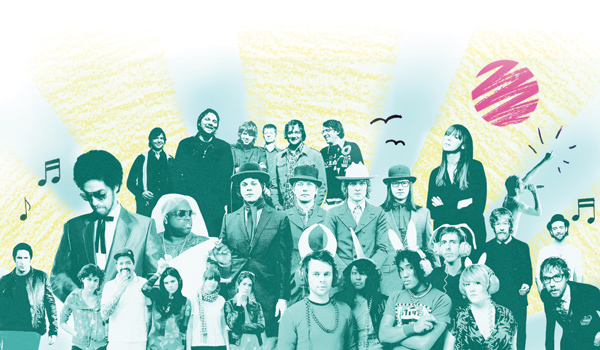
You’re a fan of the rock band the Raconteurs. Sure, they have one of the hottest albums of the summer. Sure, they’re playing midsize theatres and performing arts centers across the country. Fans from Atlanta to Detroit will have a chance to see, and hear, the band up close—but you won’t, because you live in Chicago.
Here, the opportunity to see The Raconteurs comes with a price: $80, the cost of a single day’s ticket at Lollapalooza, which takes over Grant Park August 1st through 3rd. In addition to the weighty ticket—which, at presstime, had gone up to $205 for a weekend pass—a baking sun and 150,000-plus partyers make seeing any band a less than intimate experience. The upside, of course, is that there are 100 groups on the bill and something for everyone. But unless you brave the crowds and heat, there’s no chance of seeing any of the acts anywhere near Chicagoland for the rest of the summer—a contractual consequence that club owners and promoters say hurts local business.
|
5 BEST BETS The Kills The Raconteurs Radiohead The Gutter Twins Okkervil River |
In 2005, Lollapalooza was resurrected as a destination festival in Grant Park; a current agreement between the Austin, Texas-based producer, C3 Presents, and the Chicago Park District guarantees the fest a home here through 2011. Downtown hotels and restaurants benefit from the influx of tourists each year, and the Parkways Foundation, a nonprofit that aids the Park District, earns $1 million annually in donations from the festival producer; the money goes to park improvements.
Few club owners and promoters would go on the record for fear of offending city officials, but they complain privately that Lollapalooza dominates Chicago’s summer music scene in a way that they claim cuts into the local music business. Summer is considered ripe concert season, a time when vacationing fans spend the most money on shows. But Lollapalooza’s strict contracts reroute tours from smaller clubs and theatres to the festival’s seven stages, where the promise of wider exposure and better money is too hard to turn down. "Lollapalooza books [more than 100] acts. It’s pretty likely that half of them would have come through the clubs and theatres here during the summer. It does lighten the calendar year, there’s no question," said David Viecelli, president of the Billions Corporation, a Chicago-based booking agency.
Apart from arena-size headliners like Radiohead, Rage Against the Machine, and Kanye West, the majority of bands that play Lollapalooza—think Cat Power, Black Lips, or Mates of State—are better suited to play smaller venues from the Empty Bottle and Schubas up through Park West. With Lollapalooza taking those acts, venues are going dark more often than they would at other periods in the year. "No doubt about it, those booking restrictions have a downside to the local community," said Gary Bongiovanni, editor in chief of Pollstar, a trade magazine that tracks the concert industry. "But from the promoter’s perspective, the last thing they need is a band [that’s] playing their festival [also] playing a club show a week before the event."
Charles Attal, who is one-third partner at C3 Presents, explains that the "radius clauses" in his contracts prevent a band from playing the Chicago market 60 days before Lolla and 90 days afterward. "Our [contracts] aren’t that stringent. They’re normal," he says.
Metro’s owner, Joe Shanahan, said blaming Lollapalooza for a diminished summer club scene is misdirected. "I’m thrilled for us. They put on a hell of a festival," he says. Shanahan adds, however, that he would like to see the city use the fest to promote its own live music scene. "This is a golden opportunity for the city to really present itself as a world-class music destination."
Illustration: Wes Duvall


